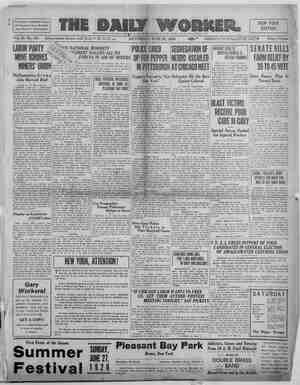The Daily Worker Newspaper, June 26, 1926, Page 7
You have reached the hourly page view limit. Unlock higher limit to our entire archive!
Subscribers enjoy higher page view limit, downloads, and exclusive features.
SATURDAY, Buyplmet +: CHE DAILY WORKER Second Section, Thts Magazine Section Appears Every Saturday in The DAILY WORKER. ALEX. BITTELMAN, Editor. JUNE 26, 1926 <0 Which Way Now? \ Mh it FTAA LHL qi} yh * Pi ee) Gary, Florida and the N egro Workers ANOTHER lynching of a Negro in Florida. A fresh and terrible reminder of the fact that the American national institution of Negro lynching still continues in existence. One more crime against the Negro masses, but so outrageous in its execution that even some of the capitalist papers felt impelled to protest mildly. | How much longer will it continue? How can it be stopped? This and the whole damnable system of keeping 12,000,000 peo- ple in the condition of pariahs., And now—Gary, the bloody disaster in the model steel trust city of Gary. Who are the victims? Workers, of course. Un- organized workers slaving for the steel trust. But most of them Negro workers, The oppressed of the oppressed. The perse- cuted of the persecuted. Pariahs even among the sldves of the steel trust. ° What is worse than that? The Negro Race Does Not Know Its Mind. THAT the situation is not hopeless, goes without saying. But it requires an entirely different outlook than the one which is at present dominating the minds of most Negroes in the United States to bring about their emancipation. In the first place, the Negro masses must cease relying upon the old capitalist parties. To believe, as some Negroes still do or pretend to do, that the Republican party can be utilized to allevi- ate the suffering of the Negro masses is to surrender the Negroes completely to the tender mercies of their worst enemies. To ex- pect the party of big imperialist capital, which is feeding on pre- cisely such practices as those the Negroes are being subjected to, is not only to expect the impossible but is outright betrayal of the most fundamental interests of the Negro race, The republican party is quite willing to play a little political game with the Negroes. Why not? It costs the republican party nothing to indulge in the game. The only people that pay for it—in life and blood—are the Negroes without ever getting any- thing in exchange. ; The Civil War Period and Today. OMETHING of a fundamental nature has changed in the life of the United States since the Civil War, the meaning of which not many Negroes have as yet realized. It is this: That the re- publican party of today is not the same as the republican party of the days of the civil war. North and South were real and acute. The capitalists of the = 1 North were waging war against the feudal aristocracy of the South on the issue of a centralized federal government and free labor to enable the industrial development of the country to pro- ceed without hindrance. This is how the republican party hap- pened to become the emancipator. of the Negro race, What is the situation today? There is no more of the old chasm between North and South as far as the rich and igaithy are concerned. The economic. system of the United States has become more unified, leaving no room for fundamental on- ism between the capitalists of North and South. It is for this reason that the republican and democratic parties, the old pro- tagonists of North and South respectively, are no longer the kind of opponents that they used to be. In fact there is no real, basic hostility between them. They are practically both the same. Both are controlled and dominated by big capital of the East, West, North and South. In view of these radical changes in the economic system of the United States and hence in the nature of the old political parties, it has become positively harmful and reactionary to con- tinue to believe that the.republican party is in any way friendlier or more sympathetic to the Negroes than the democratic party. It is also time to realize that Negro oppression is part of the capi- talist system, which the two old parties.are vitally interested to defend, to protect and to perpetuate. The Hope of the Race Is Its Toiling Masses. THE hope of the Negro race in the United States are the bulk of its membership—the workers and farmers, and those of its professional and intellectual elements who have retained their loyalty to the race and are willing to struggle and suffer in the defense of its interests, By his very position in industry, the Negro worker is called upon to assume the leadership in the struggle of the whole race for its emancipation. The Negro workers are at present to be found in large compact masses in many industrial centers of the United States. They have facilities for education and organiza- tion which most of the Negro toilers of the South are denied. The Negro workers are gradually but surely fighting their way into the labor movement and are thus establishing valuable and vital contacts with the white workers. In this way the Negro workers Then—the antagonisms between | re laying the basis for an aHiance with the rest of the American (Continued on newt page—page 2) ee nn aan ‘




